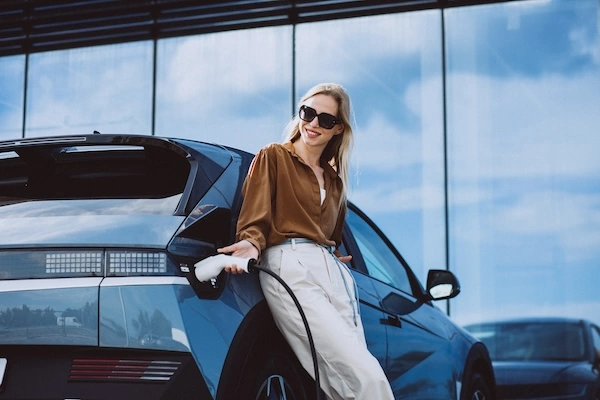Electric Vehicle Charging Explained: Home vs. Public Charging Stations
Published on: Monday, 03 February 2025 | Author: Jessica Bird
The popularity of electric cars is on the rise. In 2024, EVs made up 18.7% of new car sales — almost tripling the 2020 figure of 6.6%.
With a noticeable spike in EV popularity in recent years, there has been a simultaneous increase in electric vehicle charging points. In just one year, there has been a 53% increase in public EV charging points around the UK, reaching nearly 100,000 locations in 2024. Electric vehicle owners can also opt for a home charging point — but are they worth it? There are pros and cons to both types of charging points, but which is more convenient and cost-efficient?
In this blog, we’ll weigh up the advantages and disadvantages of both EV charging types to see how they compare. So, whether you’ve been driving electric cars since the Nissan Leaf in 2010, or you’re considering your first electric vehicle, you’ll know whether to invest in a home charging point or to have a mental map of all your nearest charging points by the end of this piece.
How does EV charging work?
The thought of charging a vehicle in a similar way to how we charge our phones might still sound like a sci-fi movie to you. However, there’s a little more to it than just plugging the vehicle in for a couple of minutes and having a full battery.
There are various levels of EV chargers — each relating to the speed of charge. Below we take a look at each charging type in turn.
Level 1
While Level 1 charging is usually the most cost-effective, this charging type may not bode well for a quick pitstop. It takes a considerable amount of time to charge to full — taking upwards of 40+ hours for a full charge on a basic electric vehicle or a charging time of 4-6 hours for a hybrid. Level 1 chargers are often the type of domestic EV charging ports that come with the car.
Level 2
Level 2 offers a faster level of charging, using an alternating current. As such, they are commonly found at businesses, public parking, and residential locations. Level 2 chargers can charge a battery-powered electric vehicle (BEV) to 80 per cent from empty in 4-10 hours and a PHEV (Plug-in hybrid vehicle) in 1-2 hours.
Level 3
The fastest level of charge is Level 3 — typically able to charge an EV to 80% in only 15 to 60 minutes. This rapid charging type uses very high voltages between 400v and 1000v to achieve such a high-speed charge, but is the most costly.

Public EV charging stations
Public EV chargers provide convenient access for drivers to recharge their electric vehicles when they're away from home or on a long journey. They come in various types and speeds, making it easier for drivers to stay powered up during road trips or daily commutes.
How much is it to charge an electric vehicle in public?
The price of charging an electric vehicle is dependent on numerous factors, such as model, size of battery, and where you go to charge.
The general rule of thumb for charging at a public charging station is: the slower you charge, the cheaper it will be. It can cost you as little as £13 to charge your electric car fully, which is considerably cheaper than refuelling a petrol car (as the cost of a tank of fuel can be up to around four times this).
The convenience of public charging
It’s never been easier to charge your electric vehicle — and, depending on where you are in the country, you’re often only a few minutes away from an EV charging port. In fact, the average distance to an electric vehicle charger in England is only 3.8 miles. Even more impressively, in some areas of London, the average distance between you and an EV charger is only 97 metres!
The downsides of public electric vehicle charging
Whilst there are plenty of incredible benefits to electric vehicles, there are some downfalls when it comes to public charging. Electric vehicles take a lot of time to charge — it’s not just a case of quickly pulling over into a service station and filling your tank like with regular petrol vehicles. If you want a faster charger, they are also less available and will cost you more when you do find them.
Something else to consider is the waiting times for EV chargers in public during peak hours. Again, in comparison to filling a tank, other drivers will also want a fair amount of charge and are therefore likely to be using the chargers for a substantial amount of time.
Home EV chargers
Having a home charging station is very convenient for electric vehicle drivers, allowing them to get their car charged up overnight — a habit that many of us already have for some of our most-used devices.
Whilst most EVs will come with a charger now, older EVs are less likely to. This is because early electric vehicle technology had different charging standards. If they do come with one, it'll vary as to what type of charger you get.
If you buy a new EV, you’ll typically get at least one charging cable, but the type and number may vary. In most cases, new EVs will come with a Type 2 charger which will offer Level 2 charge.

Cost and installation considerations
Having an electric charger installed and available at home is incredibly convenient as an EV driver. However, there are the costs and installation factors you’ll need to consider. If you own your home, then you don’t need to ask for the charger to be installed, but, if you rent, you may come across problems if the landlord opposes the installation.
Having an EV charger installed can add more expense whilst you’re already forking out for the cost of a new car. At the time of writing, the average cost for a 3kW charger supply is £375 and £625 for a 7kW charger. To get it installed, it’ll cost you around £1000 (though, with a government grant, it takes the price down to £650).
Typically, home electric vehicle chargers will be added to your overall electric bill. Again, the cost per month will depend on your usage, model, and charger type. Based on an average 3.6 kWh per day, or 108 kWh per month, you might add another £47 to your bill a month.
The challenges of home electric vehicle charging
Whilst reducing the amount of time you spend waiting at a public charging point for your electric vehicle is great, it’s important to consider the challenges that home EV charging can pose.
Firstly, your home electric system may not have the capacity to facilitate charging your vehicle — cars are chunky bits of kit, after all. You’ll need to work out what charger type will suit your home system, or discuss it with an expert.
Secondly, the place where your charger has to be installed may be awkward for your vehicle; your lead may be too short or, considering your driveway shape, it might be that you have to park awkwardly to charge. If the installation is on the roadside, there will be permits and regulations that will need to be followed which might inconvenience you further.
Heading 2 with Paragraph
Electric vehicles are a great, eco-friendly alternative to traditional ICE vehicles. At Tyre Pros, we want you to make the most of your electric car, and its tyres play a crucial role in that. If you have any concerns about your EV tyres, contact us today and book a free tyre check.
For more inspiration, stay up to date with our blog for the latest in the motoring world.




